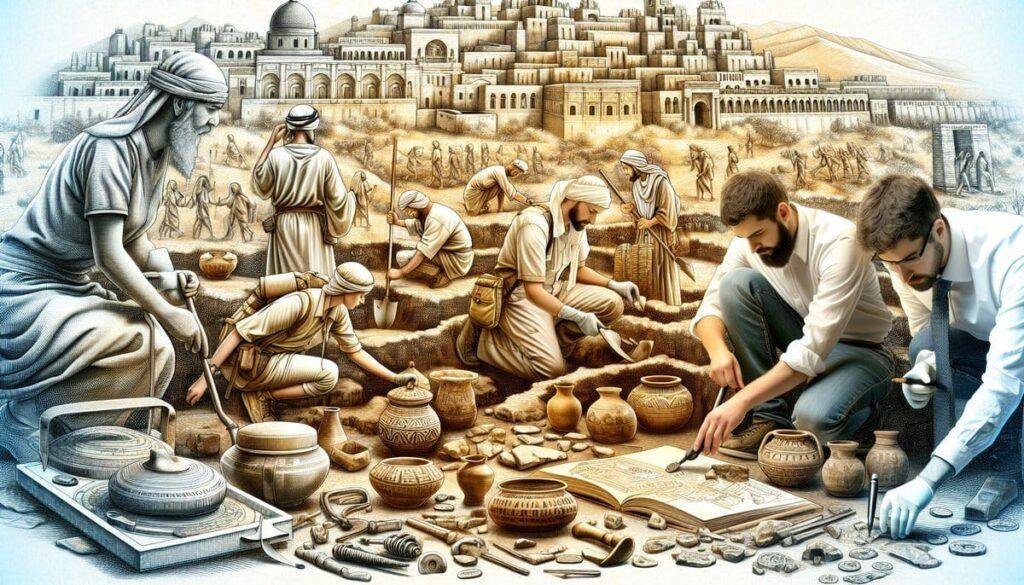Have you ever found yourself wandering through the pages of history, wondering how ancient wisdom applies to our tumultuous times? It’s a journey that leads us not just through archaeology but into the hearts and minds of those who faced crises far greater than a fleeting moment. In interpreting sacred passages, we unlock doors to understanding—especially during times of turmoil.

The Old Marketplace: A Nexus of Culture and Crisis
Imagine stepping into an ancient marketplace, where merchants hawked goods from the farthest reaches of the known world. This was not merely a place for trade; it served as a vibrant hub of cultural exchange and religious significance. When crisis struck—be it famine, war, or plague—these marketplaces often became arenas for both despair and resilience.
You might ask why? The answer lies in how communities coalesced around shared beliefs to navigate their challenges. These sacred passages, be they texts or oral traditions, acted as guiding lights in the murky waters of uncertainty.
Scriptural Roots: Understanding Sacred Texts
Sacred texts, whether the Bible, the Quran, or other spiritual writings, have provided solace for individuals confronting hardship. The wisdom found within these pages often reflects collective human experiences during dire moments.
The Bible: In the Old Testament, for instance, the Book of Lamentations addresses the deep sorrow of the Israelites after the destruction of Jerusalem. You can feel the raw emotion as the author grapples with loss, turning to God for solace.
The Quran: In the Quran, the story of Prophet Job—or Ayoub—resonates with those battling despair. His patience in the face of monumental challenges serves as a beacon of hope that “after hardship comes ease” (Quran 94:6).
By engaging with these texts, you can glean insights that speak directly to your current struggles.
The Role of Biblical Archaeology
Biblical archaeology plays a pivotal role in contextualizing these sacred passages. Through the painstaking recovery of artifacts and ancient texts, scholars paint a detailed picture of life during biblical times.
For instance, excavations at sites like Qumran, where the Dead Sea Scrolls were found, have unveiled portions of biblical texts that date back to the second century BCE. Such finds not only validate scriptural references but also provide insight into the historical contexts from which these narratives emerge.
In your reading, consider the implications of these archaeological findings. How do they enhance your understanding of the struggles faced by ancient communities? What parallels can you draw to modern crises?

Sacred Passages: A Guide Through Crisis
Sacred passages do more than merely provide comfort; they offer practical guidance that can be dissected and applied to our lives. Whether you’re weathering a personal storm or a global crisis, there are themes that resonate with resilience and hope.
Themes of Resilience
Resilience is a recurring theme found in many sacred texts. Take a closer look at a few notable verses:
Isaiah 41:10 (Bible): “Do not fear, for I am with you; do not be dismayed, for I am your God. I will strengthen you and help you; I will uphold you with my righteous right hand.” This passage encourages an ongoing relationship with the divine, underscoring the importance of community during tough times.
Psalm 46:1 (Bible): “God is our refuge and strength, an ever-present help in trouble.” You might find comfort in the notion that divine support is vigilant, especially when you’re going through hardships.
Call to Action
Sacred texts often evoke a response from their readers. Recognizing that faith and action can go hand-in-hand invites you to see your crisis from a different perspective. How can you find strength not just in your beliefs but also in your actions during these challenges?
Take the story of the Good Samaritan. In Luke 10:25-37, Jesus illustrates the importance of community support and service to others in need. Amid your own personal trials, how might you extend a hand to someone else?
The Historical Context of Crisis
Understanding crises through a historical lens fosters a richer comprehension of human behavior. History is replete with examples of societies rising from the ashes of turmoil, using those moments to transform and rebuild.
Plagues and Displacement
The Black Death ravaged much of Europe in the 14th century, decimating populations and instigating widespread fear. During this time, communities turned to faith in search of meaning. The writings of clerics from this time reflect the turmoil, fostering a belief in divine will over human understanding.
Similarly, consider how the ancient Babylonian Exile impacted the Jewish people, leading to profound religious and social transformations. Scripture produced during this time not only served as a reminder of faith but also as a roadmap to survival.
Lessons Learned
We glean wisdom from these historical narratives. You may ask how these past crises can shed light on your current experiences. In moments of desperation, remember the resilience of those who came before you. They, too, faced shadows, yet within them lay the seeds of hope.
Connecting Ancient Wisdom with Modern Challenges
So here’s a thought: how can the insights gleaned from sacred passages and historical contexts inform your approach to contemporary issues?
Mental Health and Spirituality
In today’s world, mental health challenges are pervasive. Many people turn to spirituality to find solace. There’s an intrinsic belief across cultures that engaging with sacred texts can provide comfort and promote emotional well-being.
Research indicates that reading and reflecting on sacred literature can elevate mood and reduce anxiety. You might consider setting aside time for this practice during periods of stress.
Community Support
As previously mentioned, community is pivotal during times of crisis. Just as ancient societies banded together in hardship, modern individuals can seek out and create supportive networks.
Consider forming a group that meets weekly to discuss, share experiences, and support one another. This practice not only echoes ancient communal actions but fortifies your own resilience in your day-to-day life.
The Role of Faith During Turbulent Times
Faith, whether in a deity, community, or oneself, often acts as a foundation during challenging times. You might find comfort in this steadfast belief while confronting your unique battles.
Personal Testimonies
There’s something powerful about listening to personal testimonies from individuals who traversed their crises with faith. For example, in religious communities, sharing stories of overcoming adversity can foster a climate of hope and strength.
You’ll find varied experiences resonate in different ways, reinforcing that there’s no one right way to respond to hardship.
Faith in Action
Put your faith into action! Engage in charitable acts, volunteer your time, or simply extend kindness to those around you. These small gestures can transform your perspective, allowing the divine to work through you during your trials.
Concluding Thoughts
As you reflect on the sacred passages that have shaped your understanding of crisis, consider how these ancient teachings continue to resonate in the modern world. The struggles faced by those before you create a tapestry of shared human experience, illuminating paths out of despair.
While chaos may yet reign around you, hold tight to the threads of resilience, faith, and community. You are, after all, a part of this ongoing narrative—a narrative that began long before you and will continue into the future.
Remember, it’s in the darkest moments that the brightness of hope shines strongest.
In wrapping up, driving home the importance of these sacred insights can provide a guiding compass through not just your personal storms, but the collective uncertainties we all share.


